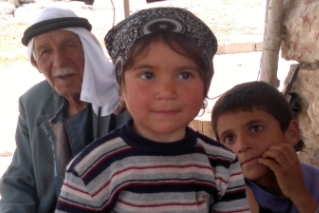 Photo by Yafit Gamilah Biso
Photo by Yafit Gamilah BisoTomorrow (30 July 2012), the Israeli High Court will hear the petition of the residents of Khirbat Zanuta and the Association of Civil Rights in Israel (ACRI) against the Civil Administration’s decision to demolish the village. The Court will convene as a panel of three Justices: Noam Sohlberg, Hanan Melcer, and Edna Arbel.
Khirbat Zanuta is a small Palestinian village in the south Hebron Hills, whose 39 families earn their living by husbandry of sheep. The village has been settled for several generations, and is situated on the ruins of an ancient settlement. Historically, the villagers lived in natural caves, but in the 1980s, most of these caves became uninhabitable. The villagers now live in stone houses covered with tin and plastic roofs and in other temporary structures, and use the caves, along with external pens, as shelter for their sheep.
In 2007, the Civil Administration issued demolition orders for most of the buildings in Zanuta. The State’s position is that the structures are illegal because they were built without permits (or subsequent variances). But there is no way the villagers could have received permits since there is no master plan for the village.
In the State’s response to the petition, the Civil Administration claims that there is no justification for a master plan that would incorporate Zanuta, citing, among other things, the village’s small size, the existence of archeological ruins on the premises, and the relatively long distance between the village and the towns of Dahariya and Shawicha. The State’s response does not address the question of what will become of the residents of the village if they are expelled from their homes.
According to ACRI Attorney Nira Shalev, who filed the petition: “Tomorrow the High Court will rule whether an entire community is to be destroyed, to lose its homes and its livelihood and give up a centuries-old way of life – because of a Kafkaesque policy imposed by the Civil Administration on the Palestinian population of Area C. The Civil Administration’s circular argument in the case of Khirbat Zanuta is a clear example of this policy: the village must be destroyed because there are no building permits, but building permits cannot be obtained because the village doesn’t qualify for a master plan. This policy completely ignores the basic needs and rights of the residents to shelter, water, livelihood, and dignity.”
More on Khirbat Zanuta and the petition







